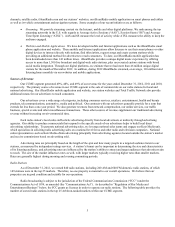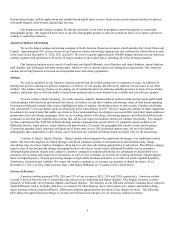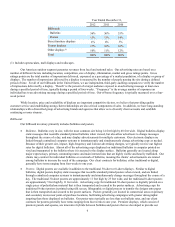iHeartMedia 2012 Annual Report Download - page 14
Download and view the complete annual report
Please find page 14 of the 2012 iHeartMedia annual report below. You can navigate through the pages in the report by either clicking on the pages listed below, or by using the keyword search tool below to find specific information within the annual report.11
License Renewal
The FCC grants broadcast licenses for a term of up to eight years. The FCC will renew a license for an additional eight-year
term if, after consideration of the renewal application and any objections thereto, it finds that the station has served the public interest,
convenience and necessity and that, with respect to the station seeking renewal, there have been no serious violations of either the
Communications Act or the FCC’s rules and regulations by the licensee and no other such violations which, taken together, constitute
a pattern of abuse. The FCC may grant the license renewal application with or without conditions, including renewal for a term less
than eight years. The vast majority of radio licenses are renewed by the FCC for the full eight-year term. While we cannot guarantee
the grant of any future renewal application, our stations’ licenses historically have been renewed for the full eight-year term.
Ownership Regulation
FCC rules and policies define the interests of individuals and entities, known as “attributable” interests, which implicate FCC
rules governing ownership of broadcast stations and other specified mass media entities. Under these rules, attributable interests
generally include: (1) officers and directors of a licensee or of its direct or indirect parent; (2) general partners, limited partners and
limited liability company members, unless properly “insulated” from management activities; (3) a 5% or more direct or indirect voting
stock interest in a corporate licensee or parent, except that, for a narrowly defined class of passive investors, the attribution threshold
is a 20% or more voting stock interest; and (4) combined equity and debt interests in excess of 33% of a licensee’s total asset value, if
the interest holder provides over 15% of the licensee station’s total weekly programming, or has an attributable broadcast or
newspaper interest in the same market (the “EDP Rule”). An entity that owns one or more radio stations in a market and programs
more than 15% of the broadcast time, or sells more than 15% per week of the advertising time, on a radio station in the same market is
generally deemed to have an attributable interest in that station.
Debt instruments, non-voting corporate stock, minority voting stock interests in corporations having a single majority
stockholder, and properly insulated limited partnership and limited liability company interests generally are not subject to attribution
unless such interests implicate the EDP Rule. To the best of our knowledge at present, none of our officers, directors or 5% or greater
shareholders holds an interest in another television station, radio station or daily newspaper that is inconsistent with the FCC’s
ownership rules.
The FCC is required to conduct periodic reviews of its media ownership rules. In 2003, the FCC, among other actions,
modified the radio ownership rules and adopted new cross-media ownership limits. The U.S. Court of Appeals for the Third Circuit
initially stayed implementation of the new rules. Later, it lifted the stay as to the radio ownership rules, allowing the modified rules to
go into effect. It retained the stay on the cross-media ownership limits and remanded them to the FCC for further justification (leaving
in effect separate pre-existing FCC rules governing newspaper-broadcast and radio-television cross-ownership). In 2007, the FCC
adopted a decision that revised the newspaper-broadcast cross-ownership rule but made no changes to the radio ownership or radio-
television cross-ownership rules. In 2011, the U.S. Court of Appeals for the Third Circuit vacated the FCC’s revisions to the
newspaper-broadcast cross-ownership rule and otherwise upheld the FCC’s decision to retain the current radio ownership and radio-
television cross-ownership rules. The U.S. Supreme Court denied review of the Third Circuit’s decision. The FCC began its next
periodic review of its media ownership rules in 2010, and has issued a notice of proposed rulemaking. We cannot predict the outcome
of the FCC’s media ownership proceedings or their effects on our business in the future.
Irrespective of the FCC’s radio ownership rules, the Antitrust Division of the U.S. Department of Justice (“DOJ”) and the
U.S. Federal Trade Commission (“FTC”) have the authority to determine that a particular transaction presents antitrust concerns. In
particular, where the proposed purchaser already owns one or more radio stations in a particular market and seeks to acquire additional
radio stations in that market, the DOJ has, in some cases, obtained consent decrees requiring radio station divestitures.
The current FCC ownership rules relevant to our business are summarized below.
Local Radio Ownership Rule. The maximum allowable number of radio stations that may be commonly owned in a
market is based on the size of the market. In markets with 45 or more stations, one entity may have an attributable
interest in up to eight stations, of which no more than five are in the same service (AM or FM). In markets with 30-44
stations, one entity may have an attributable interest in up to seven stations, of which no more than four are in the same
service. In markets with 15-29 stations, one entity may have an attributable interest in up to six stations, of which no
more than four are in the same service. In markets with 14 or fewer stations, one entity may have an attributable interest
in up to five stations, of which no more than three are in the same service, so long as the entity does not have an interest
in more than 50% of all stations in the market. To apply these ownership tiers, the FCC relies on Arbitron Metro Survey
Areas, where they exist, and a signal contour-overlap methodology where they do not exist. An FCC rulemaking is
pending to determine how to define radio markets for stations located outside Arbitron Metro Survey Areas.
























